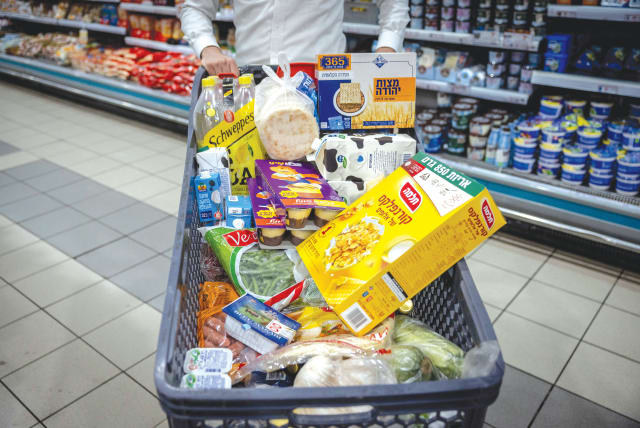Comptroller: Israelis buckling under high cost of living, gov't must do more

"The State of Israel is characterized by high concentration in the food market," said the comptroller. "We cannot accept the lack of action by government officials regarding concentration."
Food prices rose between 2.9% and 6% in the first three months of the Israel-Hamas War, according to a report by State Comptroller Matanyahu Englman released on Tuesday.
These price hikes followed an 18% cut in manpower in the food industry and a 50% cut in the production of factories.
The report looked at concentration in the food and final goods markets and its impact on the cost of living.
“The State of Israel is characterized by high concentration in the food market,” said Englman. “We cannot accept the lack of action by government officials regarding concentration.”
This concentration “has direct implications on the cost of living. In the past year, we have experienced price increases, and the citizens of Israel are buckling under the [weight of the] cost of living,” he said, adding that “the prime minister and ministers must fight the high cost of living.”
The purchasing power of Israelis is 300% lower than that of consumers in France, the US, and the UK when looking at hourly wages and purchasing power for products checked in the report, according to the comptroller.
Food prices, not including fruit and vegetables, have risen 23% since 2011, while the price of fruits and vegetables rose by 37% in the same time frame, the report said.
In 36 of 38 categories in the food industry, there is a high level of concentration. In 20 categories, the share of the three companies that dominate the category is higher than 85%, while the average of these companies’ share in all categories is 84%, according to the report.
The market share of the five biggest suppliers in the food and final goods markets has shrunk slightly since 2017, from 42.7% to 37.5% in 2022, but the concentration in these markets is still high, according to the report, citing the Competition Authority.
Import-to-gross domestic product ratio
The report also noted the following: The country’s import to gross domestic product ratio is just 23.4% compared to 47%, which is the average in OECD countries; around 25% of Israel’s big stores have a high level of geographic concentration; and the Competition Authority has not done enough to examine its part in breaking up concentration in these markets.
The fact that the ministerial committee established to fight the high cost of living has only met seven times since it was founded in June 2023 in spite of prices increasing and the impacts of war on prices was also highlighted in the report.
Englman called on the political leadership to follow up on reforms and to verify that they are updated and appropriate to contend with the cost of living and increased food prices.
Jerusalem Post Store
`; document.getElementById("linkPremium").innerHTML = cont; var divWithLink = document.getElementById("premium-link"); if (divWithLink !== null && divWithLink !== 'undefined') { divWithLink.style.border = "solid 1px #cb0f3e"; divWithLink.style.textAlign = "center"; divWithLink.style.marginBottom = "15px"; divWithLink.style.marginTop = "15px"; divWithLink.style.width = "100%"; divWithLink.style.backgroundColor = "#122952"; divWithLink.style.color = "#ffffff"; divWithLink.style.lineHeight = "1.5"; } } (function (v, i) { });

